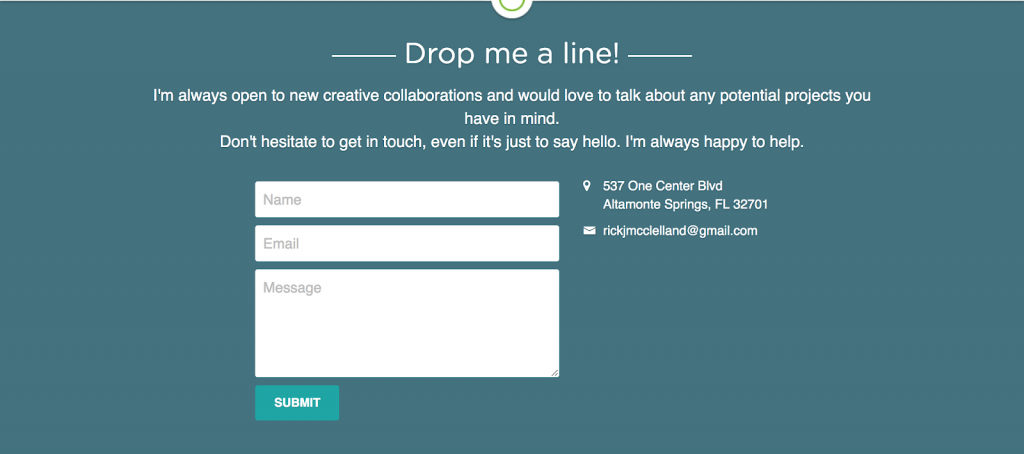Step 2: Think niche first, then think specialty
Your portfolio is your opportunity to showcase to the world the type of freelancer you want to be even if you dont necessarily have experience.
Lets say you work a regular 9-to-5 job but dream of becoming a freelance writer one day. Your freelance portfolio website should be dedicated to all the work you do as a writer.
Great start. But then you need to niche down your market.
If you want to be a writer, ask yourself: How do I want to position myself as a writer? Copywriter? Content marketer? Blogger? And who are you writing for?
Niche down your specialty and add it to your website. Think about who exactly will be using your services:
- How old are they?
- Where do they live?
- What are their interests?
- How much do they make?
- What books do they read?
Here are a few examples:
(Hmm that last one seems familiar)
And dont worry. If you try something out and dont find its a good fit for you (or your wallet), you can always change your roles. Thats the beauty of freelancing.
Case study: How Brian turned his video hobby into a business
Brian loved to make films so much so that he enrolled in film school. But halfway through he realized he didnt have a clue on how to turn his passion into a profitable business.
He understood the technical and artistic side of filmmaking, but he didnt know how to sell his skills.
So he decided to invest some time into learning how to freelance properly.
Within three weeks, Brian figured out how to turn his hobby into a marketable business: Producing high-end wedding videos. Armed with this knowledge, he set two goals for himself:
- Book three weddings and have one of them be from a couple he didnt know.
- Earn enough to pay for a new camera (about $1,200).
At the beginning, I was pretty much giving the videos away, he recalls. One was free. A couple was $450. By the end of the first season, clients were paying $1,000 for each video. I saw that I was giving people valuable material. They werent paying just to help me out. That meant a lot. They really wanted what I was offering.
He was able to book six clients within a few months. Three of them were people he didnt know!
With each wedding he filmed, he gained a better sense of how many weddings he needed to book in order to turn a profit and how he could better market his hustle.
Nobody else is a full-time wedding videographer in my area, he says. There are some people doing commercial and real estate video. But for now, Im sticking with weddings and doing it better than anyone else. My clients appreciate that, and it makes it simpler for me.
Lesson learned:
Brian niched down his passion of filmmaking into a marketable product of filming high-end wedding videos. By doing so, he turned his hobby into a side hustle earning him thousands of dollars each month.
Once you do the same with your hustle and freelance portfolio, its time to actually put samples of your work online for prospective clients to see.
Step 3: Build out your portfolio (even if you don’t have any “real” work yet)
This is the core of your portfolio. Its your opportunity to show potential clients why youre the right freelancer to hire through work youve already done.
Heres where a beginner freelancer will run into the Job Seekers Paradox. Where are you going to find examples of your work to get clients if youve never had any work?
Here are two areas I suggest going to in order to find samples for your portfolio:
Create new work for yourself.
Maybe youre transitioning to a new line of work. Maybe youre just starting your freelance career from scratch. Theres no reason you cant create new or mock clips to showcase your skills.
Thats exactly what one of our students, Heidi, did when she crafted a fashion design portfolio that helped her break into the industry.
I got my start in the industry because I had Adobe Illustrator on my resume along with the portfolio I created, she says. I finally felt like my dreams had come true. I could say the words Ive wanted to say since I was a little girl, Im a fashion designer.
You can do the same for your industry. For example, if youre a copywriter looking to land nonprofit clients, you might create a 700-word donation email to show your skills.
Really gunning to write for finance blogs? Write a few blog posts based on financial news.
Or maybe youre a graphic designer looking for big-name commercial clients. You might create a flashy ad for Coca-Cola or Nike. In fact, theres a whole community of people who create unsolicited redesigns for just this purpose.
Having work to show at all is much more important than whether or not they come from a job with an actual client.
Do free client work.
Now its an oft-touted rule that if youre good at something, you never do it for free. Im here to say forget that rule.
Instead, reframe: Its totally fine to work for free if youre working for the right people.
The most important thing for you at the beginning stages of your freelance career is for you to build relationships with clients who can open the door to more opportunities. That means you can work for free with people who are trusted and highly networked in exchange for glowing testimonials or referrals to new clients.
For more on this, check out our article on the topic.
The work you show is the work you will get. If you want to do email marketing, showcase stellar emails youve written. If you want to develop apps, link to the apps and software youve created.
Now its time to let people know how to find you.
Step 4: Make it easy to get hired (create a killer call to action)
Your portfolio should always include a place for potential clients to contact you via a call to action. This can be on a separate contact page or something as simple as including your name and email address at the top of the portfolio.
Dont overthink this. Heres a simple template you can use:
If you like what you see here, Id love to work with you. Reach out to me at tony@tonysfreelancingbiz.fake with your inquiry and Ill get back to you soon.
Other things you can include in your contact CTA:
- Name
- Location
- Social media (Twitter, LinkedIn, FB, etc.)
- Phone number
- Address
A good example of this below:

Source: Rick McClelland
Many website builders such as WordPress and Squarespace include extensions that allow you to create your own contact page thatll redirect to your email.
The most important thing is to include your CTA somewhere the client can easily find it. Dont bury it amongst your clips and sample. Just put it at the top of the page or sidebar and youre golden.


